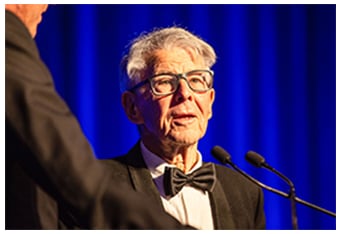With a journalism career that included providing the impetus for the downfall of an Australian Prime Minister and an investigation of the Calabrian Mafia, Peter Game (OM 1944) is routinely described as one of the legends of the Australian media landscape. But he almost pursued an entirely different path.
“English was always my best subject at school, but I didn’t have a journalism career in mind when I left School,” Mr Game explains. “Then one day I met two journalists from the now defunct Melbourne newspaper, The Argus. What they told me about their jobs was fascinating. Soon after that, I applied for a cadetship at The Herald.”
Before being given the role, Mr Game unwittingly encountered one of the newspaper’s most significant figures while he was working in his father’s menswear shop. “After I’d applied for the cadetship, Sir Keith Murdoch came in to buy a belt,” Mr Game remembers. “He was very much involved in the hiring of people at The Herald at the time and was actually there to see what sort of person I was.”
Mr Game’s six-decade career at The Herald, and later The Herald Sun, included what would become one of the most significant moments in Australia’s political history. “I tracked down Tirath Khemlani, who confirmed that the Whitlam Government was trying to borrow billions of dollars from Middle Eastern oil-rich sheiks,” he explains. “I spent four weeks with Khemlani in London recording 19 hours of interviews. Only my wife and top Herald executives knew what I was up to.”
Ultimately, Mr Game’s report gave the federal opposition justification to block supply and the dismissal of the Whitlam government followed.
Reflecting on his role in the constitutional crisis, Mr Game says his desire to follow a good story eclipsed any political preferences he may have had. “It is a bit overwhelming to think you’ve become a part of history,” he says. By coincidence the man who would follow Whitlam, Malcolm Fraser (OM 1948), also attended Melbourne Grammar during Mr Game’s time at the School, though Mr Game cannot remember him as they were several years apart.
Along with earning a Walkley Award for his work on this story, Mr Game has also been recognised by the Australian Medical Association for his investigation into the Milan Brych Affair. In 2000, he earned a Quill Award from the Melbourne Press Club for lifetime achievement in his profession and he was recently admitted to the Australian Media Hall of Fame.
However, Mr Game received early recognition for his writing skills while at Melbourne Grammar, being awarded a The Hon William Cain Prize for English in his final year at the School. The book that he received with this prize – Scott’s Last Expedition – would have far reaching effects.
“When I read the story of Scott’s tragic expedition, it fascinated me. Years later, I persuaded The Herald to send me to Antarctica with the American Navy,” he says, recalling the eight-hour flight on a Hercules that took him there. “That’s the most treasured by-line of my entire career. Not everyone has the chance to file a story from the South Pole.”
Through all these achievements and the challenges that have come with them, Mr Game says his wife Betty has been a great strength. “I couldn’t have done it without her,” he says. “She has been marvellous.”
Related topics

